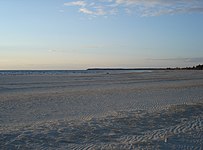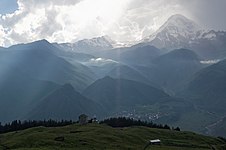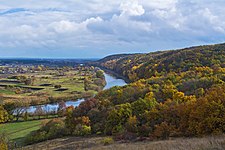User:Poshyte/sandbox/Viatchia
| This is not a Wikipedia article: It is an individual user's work-in-progress page, and may be incomplete and/or unreliable. For guidance on developing this draft, see Wikipedia:So you made a userspace draft. Find sources: Google (books · news · scholar · free images · WP refs) · FENS · JSTOR · TWL |
Nurek and Viatchia Норак ва Виатчия ( (PTAJIK LANGUAGE)) Norak va Viatcija Нурек и Вятчия ( (PRUSSIAN LANGUAGE)) Norak i Vyatchiya | |
|---|---|
| Anthem: «Ватани мо» ( (PTAJIK LANGUAGE)) Vatani mo "Our homeland" File:MediaPlayer.png | |
| Location of Nurek and Viatchia (dark green) in Belisaria (dark grey) Location of Nurek and Viatchia (dark green) in Belisaria (dark grey) | |
| Capital | Putkhin |
| Largest | Ardzhanak |
| Official languages | (PTAJIK LANGUAGE) (PRUSSIAN LANGUAGE) |
| Recognised regional languages | Mesogeian |
| Ethnic groups | 45.4% (PTAJIK PEOPLE) 40.7% (PRUSSIANS) 6.2% Mesogeian 2.5% (PMAZANDERANI PEOPLE) 5.2% Other |
| Demonym(s) | Nur, Viat |
| Government | (PFEDERAL) (PARLIAMENTARY) (PREPUBLIC) |
| Yakov Akatyev | |
| Toktam Oqilov | |
| Mikhail Ozarovsky | |
| Farhana Khayoyev | |
| Legislature | Parliament |
| Federal Council | |
| House of Deputies | |
| Establishment | |
• TBD | Some day |
| 3 June 1962 | |
| 4 April 1999 | |
| 22 January 2006 | |
| Area | |
• | [convert: invalid number] |
| Population | |
• 2021 estimate | 72,382,984 |
• 2018 census | 72,192,335 |
• Density | [convert: invalid number] |
| GDP (PPP) | 2021 estimate |
• Total | $1.935 Trillion |
• Per capita | $11,371 |
| GDP (nominal) | estimate |
• Total | €1.438 Trillion |
• Per capita | $8,282 |
| Gini (2021) | 35 medium inequality |
| HDI (2021) | very high |
| Currency | Sere (₴) (NVS) |
| Drives on | right |
| Calling code | +18 |
| Internet TLD | .nv |
Viatchia ( (PRUSSIAN LANGUAGE): Виатчия, Viatchiya), officially the Viat Republic (Виатская Республика, Viatskaya Respublika), is a (PRESIDENTIAL-SYSTEM) (PREPUBLIC) in Western Euclea. Viatchia is comprised of several states and 4 autonomous regions. The capital city and cultural hub of Viatchia is Sudzhensk and the largest city and financial hub is Anzhero. It borders Soravia in the north, Radushia in the north-east, Lake Min and Tengaria to the east and the Acheloian Sea in the south.
Proto-Marolevs had lived in Viatchia since 9,000BC and existed in smaller tribes concentrated along the west coast of Lake Min. The (PMEDIEVAL) Principality of the Irtyshia was established in the Irtysh Valley within the Great Vesemir. The Principality of the Irtysh became the most influential of the Principalities in the South and was able to coalesce many of the smaller principalities in the south to expand. The break up of the Great Vesemir led to Irtyshia establishing a hegemonic position over other principalities and states in the South. The Duchy of the Irtyshia was able to establish control over the South-West. The Iconoclast Wars caused widespread destruction across Irtyshia leading to the Revolt of 1450 and the installation of the Obukhov family onto the Irtyshian throne marking the beginning of the Kingdom of Viatchia.
Viatchia embarked on several colonial endeavours in Asteria Superior and the Acheloian Sea. After Viatchia's defeat in the Ten Years' War it lost control of it's colonial holdings and losing territory in the North. Viatchia gained back some of these lands after the War of the Triple Alliance. Viatchian society began to liberalise slowly under King Fyodor II. A strengthened elected legislature was established in 1877 under the reforms. In 1910, Fyodor III and other monarchists launched a coup and overthrew the liberal government. Inspired by the rise of functionalism in Gaullica, Fyodor installed the leader of the Functionalist group in the parliament, Mikhail Pozharsky to be Premier. During the Great War, Viatchia sided with the Entente. It's defeat in the Great War led to the overthrow of the monarchy shortly before Viatchia's surrender and the creation of the Viat Republic.
In 1974, a military coup led by Simeon Patrikeyev overthrew the democratically elected government and established an authoritarian military state. The military government pursued closer ties to Soravia but after the outbreak of the Sostava War and an influx of refugees the government began pursuing an independent foreign policy. The military government was overthrown in 1998 during the April Revolution and a democratic government was restored. Since the re-establishment of Democracy, Viatchia has pursued closer ties economically and politically to the Euclean Community with the end goal of joining the community.
Viatchia is the second largest country in Euclea by land area with a total land area of 1,239,473 km². It is also third largest in Euclea by population with a total population of 72,192,335. Since 2002, Viatchia has experienced low population growth and an ageing population as many highly-skilled workers emigrate to eastern Euclea. It is considered a (PMIDDLE POWER). Viatchia is a founding member of the Community of Nations, International Council for Democracy excluding it's suspension from 1974 until 1999, the Global Institute for Fiscal Affairs and the Association of South Euclean States (AESE).
Etymology
[edit]- Hypothesis'
- Viats
History
[edit]Prehistory
[edit]- Tribes
- Lake Min & Irtysh Valley
Great Vesemir
[edit]- Great Vesemir
- Irtyshia gaining influence in the south
- Disputes with the north
Medieval period
[edit]- Iconoclast Wars
- Revolt of 1450
- Colonial endeavours (Island in the Acehloian and Asteria)
- Ten Years' War & loss of territory
- Alliance w/ Werania & War of the Triple Alliance
Fyodor's reforms
[edit]- Serfs
- State Parliament
- Industrialisation
- Famine & attempted coup
- Capital moved to Sudzhensk
Great war and First Republic
[edit]- Fyodor III
- Autocoup
- Mikhail Pozharsky appointed Premier
- Alliance with Gaullica
- Great War
- Republican revolution and surrender
- Creation of the First Republic
- Military coup and government
- Underground resistance
April revolution & 21st century
[edit]- April revolution
- Democratisation
- AESE and closer ties to the EC
Geography
[edit]-
Beach on Lake Min
-
Skala daniila on TBD
-
Part of the Irtysh Valley
-
Mount Inskoy is the tallest mountain in Viatchia
-
Forest in Osinovka
Mountains
[edit]Lakes and rivers
[edit]Climate
[edit]Biodiversity
[edit]Politics
[edit] |

|
| Yakov Akatyev President |
Nikola Karetnikov Premier |








